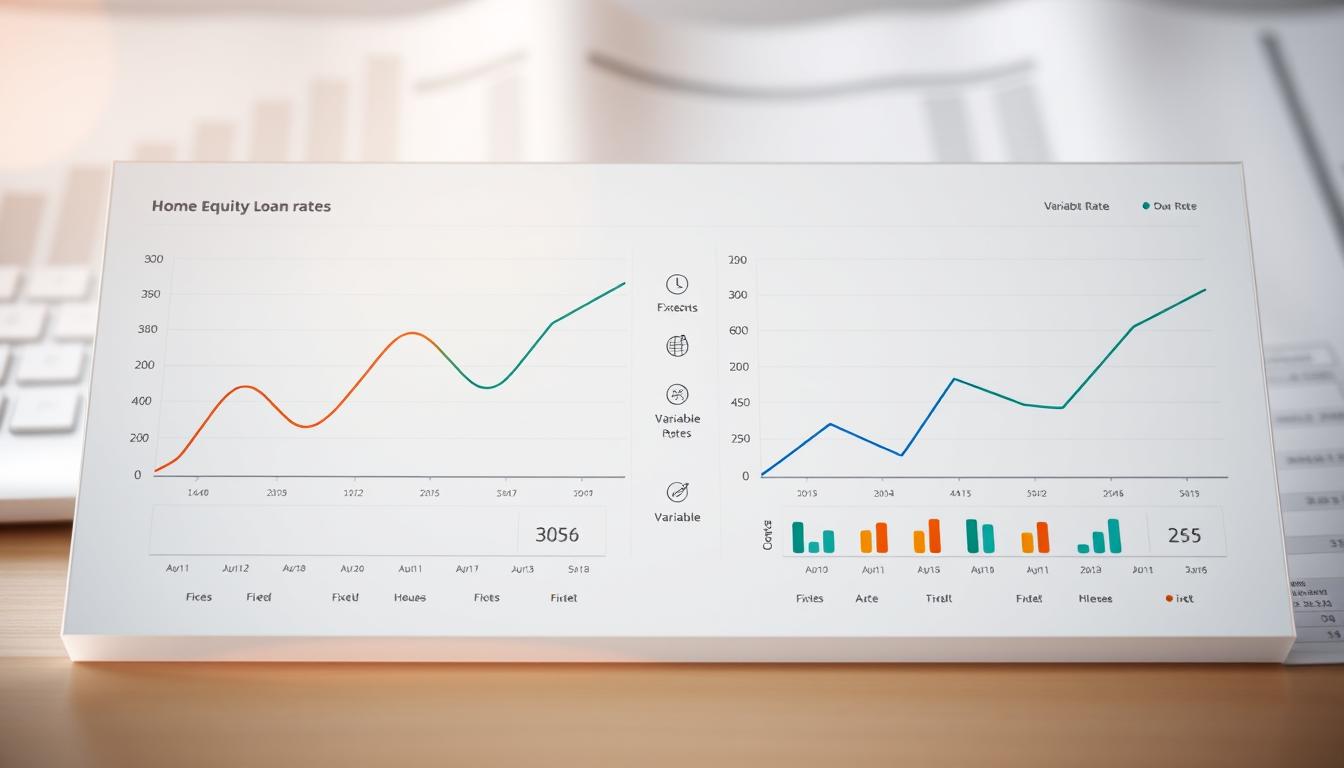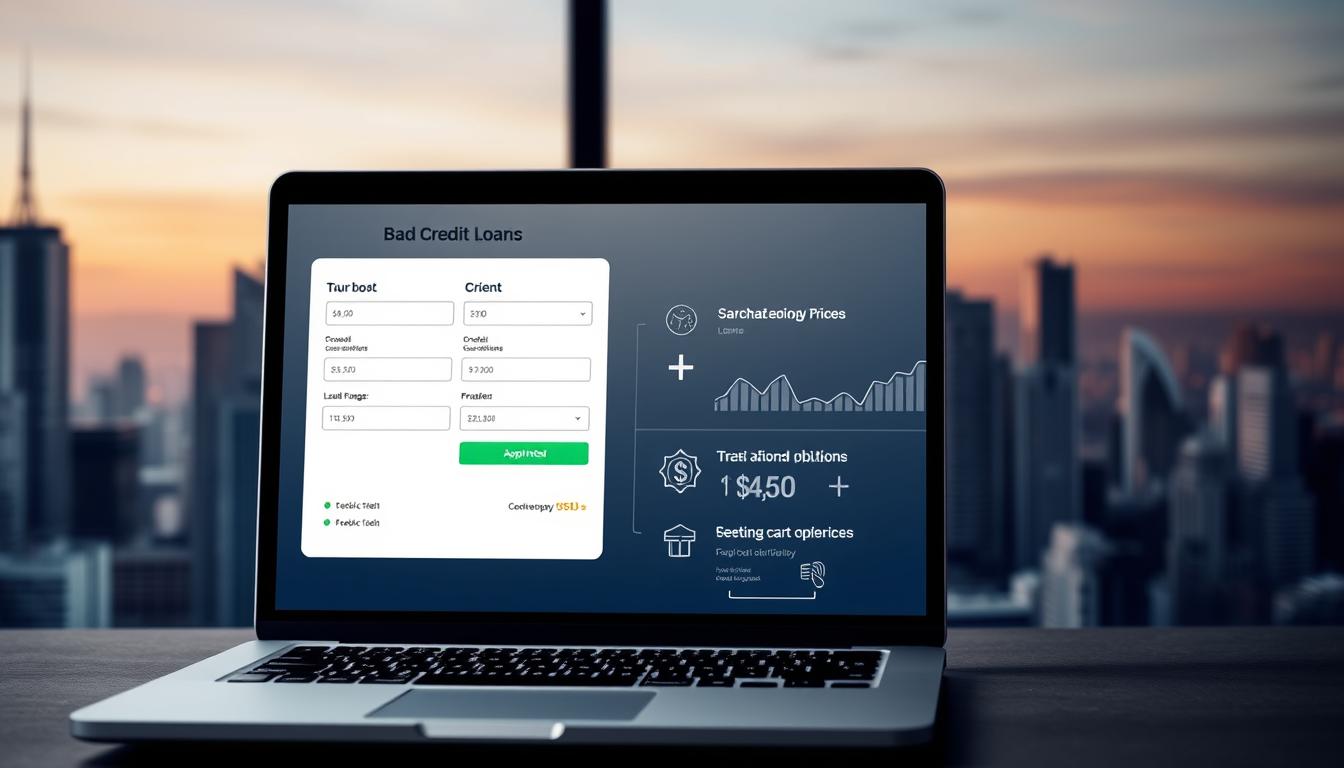Discover the Latest Home Equity Loan Rates
Did you know the average American homeowner has seen a big jump in their home equity lately? Many are now looking into home equity loan rates to use this growing asset.
Loan rates are always changing, so it’s key for homeowners to keep up with the latest. Home equity loans are a favorite for many, helping with everything from home makeovers to paying off debt.
Knowing the latest home equity loan rates helps homeowners make smart choices. We’ll dive into the current scene and what it means for those looking to borrow.
Key Takeaways
- Home equity loan rates have been fluctuating, making it essential to stay informed.
- Homeowners can use home equity loans for various expenses.
- Understanding current rates is crucial for making informed financial decisions.
- The average American homeowner has seen a significant increase in home equity.
- Home equity loans are a viable financing option.
Understanding Home Equity Loans
Home equity loans are important for homeowners to know about. They let homeowners use the equity in their homes for financial needs. This can be a big help for many.
What is a Home Equity Loan?
A home equity loan lets homeowners borrow money using their home’s equity. It’s like a second mortgage that gives a lump sum. This money can be used for home improvements, paying off debt, or for big expenses.
Key characteristics of home equity loans include:
- Fixed interest rates
- A lump sum payment
- A fixed repayment term
- The use of the home as collateral
How Does a Home Equity Loan Work?
Home equity loans let homeowners borrow against their home’s equity. A lender will check the home’s value and equity. Then, the borrower gets the loan amount in a lump sum. They repay it over a fixed term, usually with fixed monthly payments.
For example, if you borrow $60,000 for 20 years at 8.86% APR, your monthly payment is $534.45. This makes budgeting easier.
Benefits of Using Home Equity Loans
Home equity loans have many benefits. Some key advantages are:
| Benefit | Description |
|---|---|
| Low Interest Rates | Home equity loans often have lower interest rates than other loans or credit cards. |
| Tax Benefits | The interest on home equity loans may be tax-deductible, which can lower your taxable income. |
| Flexibility | Homeowners can use the loan for many things, like home renovations or paying off high-interest debt. |
Knowing how home equity loans work and their benefits helps homeowners make better financial choices.
Current Home Equity Loan Rates in the US
Knowing the current home equity loan rates is key for homeowners. They want to use their property’s value. It’s important to look at both national averages and what affects these rates.
The national average rate for home equity loans changes with the economy. Right now, it’s around 6%. But, rates can differ a lot based on the lender and your financial situation.
National Average Rates
National average rates help lenders offer good home equity loan deals. These rates are shaped by the Federal Reserve’s interest rate decisions and market conditions. For example, when the Fed changes the federal funds rate, it can affect home equity loan rates.
Factors Influencing Rate Changes
Many things can change home equity loan rates. These include economic indicators, lender competition, and borrower creditworthiness. Economic signs like inflation and job numbers can really sway rates. Also, how many lenders are competing can make a big difference.
Also, your credit score and history matter a lot. People with better credit scores get better rates. This is because they are seen as less risky.
By knowing these factors and watching national averages, homeowners can make smart choices. They might save a lot of money on interest over time.
How to Qualify for a Home Equity Loan
Knowing what it takes to qualify for a home equity loan is key. You’ll need to meet certain criteria set by lenders. These include a good credit score, stable income, and enough equity in your home.
Credit Score Requirements
Your credit score is very important for getting a home equity loan. Most lenders want a score of at least 620 to 680. But, some might ask for even higher scores, so always check with your lender.
A high credit score not only helps you qualify but also gets you a better interest rate. To boost your score, focus on:
- Paying bills on time
- Reducing outstanding debt
- Avoiding new credit inquiries
Income and Employment Verification
Lenders want to make sure you can pay back the loan. They’ll ask for:
- Pay stubs
- Tax returns (usually 2 years)
- Employment verification letter
If you’re self-employed, you might need to provide more, like business financial statements.
Equity Requirements
To get a home equity loan, you need enough equity in your home. The amount needed varies by lender. But, you usually need:
- A minimum of 15% to 20% equity in your home
- A loan-to-value (LTV) ratio that meets the lender’s requirements
For example, if your home is worth $200,000 and you owe $120,000, you have $80,000 in equity. This is often enough for most lenders.
Remember, lenders might have extra rules or restrictions. For example, we don’t lend in IA or MD, and approval isn’t guaranteed. After you apply and share your credit and property info, we’ll check if you qualify.
Fixed vs. Variable Home Equity Loan Rates
It’s important to know the difference between fixed and variable home equity loan rates. This choice can greatly affect your monthly payments and the loan’s total cost.
Understanding Fixed Rates
Fixed home equity loan rates stay the same for the loan’s life. This means your monthly payments won’t change, helping you budget better. Fixed rates offer stability and predictability, protecting you from rate hikes. For example, a fixed rate of 6% on a $100,000 loan means your payments stay the same, no matter the market.
Here are some key benefits of fixed home equity loan rates:
- Predictable monthly payments: You always know what to expect each month.
- Protection from rate hikes: Your rate won’t change, even if market rates go up.
- Easier budgeting: Fixed payments make planning your finances simpler.
Benefits of Variable Rates
Variable home equity loan rates change with the market. They might start lower than fixed rates but could go up. Yet, variable rates can offer flexibility and potentially lower costs if rates drop.
Some advantages of variable home equity loan rates include:
- Potential for lower initial rates: Variable rates might be more appealing at first.
- Benefiting from rate drops: If rates fall, your loan’s rate could go down, lowering your payments.
- Flexibility: Some variable rate loans have caps on rate increases, balancing risk and reward.

When choosing between fixed and variable home equity loan rates, think about your financial situation and risk comfort. Fixed rates are predictable, while variable rates offer flexibility and savings potential. Your choice should align with your financial goals and current market conditions.
Closing Costs and Fees Associated with Home Equity Loans
When you think about a home equity loan, remember there’s more than just the interest rate. Other fees and closing costs can quickly add up. This means the total cost of the loan is more than just the interest rate.
These costs include origination fees, appraisal fees, title insurance, and attorney fees. Knowing these costs helps you figure out the total loan expense.
Typical Closing Costs Breakdown
Closing costs for home equity loans vary a lot. They depend on the lender, where your property is, and how much you borrow. Usually, these costs are between 2% and 5% of the loan amount. Here’s a list of typical costs:
- Origination Fee: This fee is for the lender’s work on your loan. It’s between 0.5% and 1% of the loan amount.
- Appraisal Fee: You need an appraisal to check your home’s value. This fee is between $300 and $1,000.
- Title Insurance and Escrow Fees: These fees make sure your home’s title is clear. They cost between $1,500 and $3,000.
- Attorney Fees: In some places, you need an attorney at the closing. These fees vary.
How Fees Impact Overall Loan Costs
The fees for home equity loans can really affect the loan’s total cost. For example, if you borrow $100,000, closing costs could add $2,000 to $5,000. This means you’re borrowing more than you think, and the loan’s true cost is higher than the interest rate.
As Kiplinger points out, “The total cost of a home equity loan includes more than just the interest rate; fees and closing costs can add thousands to the total cost.” Knowing these costs helps you make a better choice when picking a lender and loan.
By looking closely at the fees and closing costs of your home equity loan, you can plan your finances better. This way, you can avoid unexpected expenses.
Comparing Home Equity Loan Rates from Different Lenders
Looking at home equity loan rates from various lenders can save you money. It’s not just about the interest rate. Other terms and conditions also play a big role in the total cost.

Major Banks and Credit Unions
Major banks and credit unions are great for home equity loans. They offer competitive rates and personalized service. For example, Wells Fargo and Bank of America give competitive home equity loan rates to those with good credit.
Credit unions, being owned by members, often have better terms and lower rates than big banks.
When comparing rates, think about:
- Interest rates and if they’re fixed or variable
- Loan terms and how you can repay
- Fees like origination fees and closing costs
Checking current rates on websites like Bankrate is a good idea. It helps you see what’s available in the market.
Online Lenders to Consider
Online lenders are gaining popularity for home equity loans. They offer convenience and competitive rates. Companies like Figure and LoanDepot make applying easy and fast. They’re great for those looking for online lenders for home equity loans.
When looking at online lenders, consider:
- The lender’s reputation and what customers say
- The variety of loan products and terms
- Any extra fees or charges
By comparing rates and terms from both traditional and online lenders, you can choose wisely. This ensures you find the best fit for your financial needs.
The Impact of Interest Rate Trends
Looking at home equity loans, interest rate trends play a big role. They change how much it costs to borrow money and shape homeowners’ financial plans.
Historical Rate Trends over the Past Decade
Interest rates for home equity loans have changed a lot over the last ten years. At first, rates were low, helping people borrow and fix up their homes. But as the economy shifted, so did the rates.
Some important trends include:
- Rates dropped a lot during tough economic times, making borrowing more appealing.
- As the economy got better, rates went up, making home equity loans more expensive.
- Lately, rates have been steady with some small changes based on the economy.
Predictions for Future Rate Changes
Forecasting future rate changes involves looking at the economy and making predictions. Experts watch inflation, job numbers, and Federal Reserve actions closely.
Some possible future trends are:
- Rates might go up if inflation gets too high.
- Rates could stay the same if the economy keeps doing well.
- Changes in rates might happen if the Federal Reserve makes new policies.
Knowing these trends helps borrowers make better choices about when to get a home equity loan.
When is the Best Time to Secure a Home Equity Loan?
Getting a home equity loan at the right time can save a lot of money. It’s important to watch economic trends and be ready financially. Home equity loans let homeowners use the value they’ve built up in their property. But, when to get one is key.
Economic Indicators to Watch
Looking at economic indicators is crucial for the best time to get a home equity loan. Interest rates, inflation, and the economy’s state are important.
- Interest Rates: Low interest rates are good for home equity loans, as borrowing costs are lower.
- Inflation: High inflation can make loans more expensive due to higher interest rates.
- Economic Growth: A strong economy might mean higher interest rates, as people want more credit.
| Economic Indicator | Impact on Home Equity Loans |
|---|---|
| Low Interest Rates | Favorable for borrowing, lower monthly payments |
| High Inflation | Potential for higher interest rates, increased borrowing cost |
| Economic Downturn | May lead to lower interest rates, but lenders might tighten credit requirements |
Personal Financial Considerations
Homeowners should also think about their personal finances before getting a home equity loan.
- Credit Score: A good credit score can get you better rates.
- Income Stability: Lenders like borrowers with steady income.
- Debt-to-Income Ratio: A low ratio can help you get a better loan.
By looking at both economic trends and personal finances, homeowners can find the best time for a home equity loan. This will meet their needs.
How to Apply for a Home Equity Loan
To apply for a home equity loan, knowing what’s needed is key. We’ll walk you through it, making sure you’re ready for a smooth application.
Required Documentation
Start by collecting all the documents you’ll need. Lenders usually ask for:
- Proof of income (pay stubs, W-2 forms)
- Identification (driver’s license, passport)
- Property information (property deed, mortgage statements)
- Credit history (credit reports)
Having these documents ready makes the application faster. Lenders use them to check if you can get the loan and how much your property is worth.
Steps in the Application Process
The home equity loan application has several steps:
- Pre-approval: First, we check if you qualify based on your credit, income, and property value.
- Application submission: Then, you send in your application and the needed documents.
- Processing and appraisal: Next, we review your application and might appraise your property.
- Approval and closing: After that, we approve you, and you sign the loan to get the money.
After you apply, we check if you qualify. This involves looking at your finances and your property’s value.
Knowing what documents you need and the application steps helps. It makes your application more likely to succeed.
Alternatives to Home Equity Loans
Home equity loans are not the only way for homeowners to use their property’s value. Other financial options can provide the funds you need with different terms.
Home Equity Lines of Credit (HELOC)
A Home Equity Line of Credit (HELOC) is a flexible choice. It lets you borrow against your home’s equity as needed, not all at once.
- Flexibility: Borrow only what you need, when you need it.
- Repayment Terms: Often have variable repayment terms, allowing for interest-only payments during the draw period.
- Potential Tax Benefits: The interest may be tax-deductible; consult a tax advisor.
Personal Loans vs. Home Equity Loans
Personal loans are another option, offering unsecured financing without risking your home.
- Collateral: Personal loans are unsecured, while home equity loans use your home as collateral.
- Interest Rates: Personal loans often have higher interest rates compared to home equity loans.
- Loan Amounts: Home equity loans typically allow for larger loan amounts based on your home’s equity.
When looking at these alternatives, think about your financial situation and your ability to repay. Also, consider the loan’s purpose.
Frequently Asked Questions about Home Equity Loans
Exploring home equity loans brings up many questions and myths. We’ll tackle some of the most common questions, debunk myths, and explain important terms. This will help you make smart choices.
Myth-Busting Home Equity Loans
Many think home equity loans are only for those in financial trouble. But, they can also fund home improvements or help pay off debt. We’ll look at other myths and give you the real facts. This way, you’ll know the good and bad about home equity loans.
Understanding Key Terms
It’s crucial to know terms like “loan-to-value ratio” and “APR” when dealing with home equity loans. We’ll explain these and how they affect your loan. Knowing these terms helps you compare loans and choose wisely for your finances.
By answering your questions and explaining key terms, we aim to help you make informed choices. This way, you can better understand your financial options.









